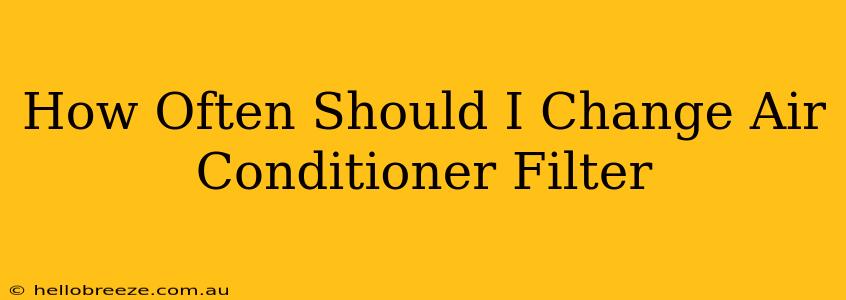Keeping your home cool and comfortable during those sweltering summer months relies heavily on your air conditioner. But did you know that a simple, often overlooked component – your air conditioner filter – plays a crucial role in its efficiency and longevity? Ignoring regular filter changes can lead to increased energy bills, reduced cooling capacity, and even premature system failure. So, how often should you change your air conditioner filter? Let's dive in!
Understanding the Importance of Air Conditioner Filter Replacement
Your AC filter acts as a vital barrier, trapping dust, pollen, pet dander, and other airborne particles. These particles not only affect your indoor air quality, potentially triggering allergies or respiratory issues, but they also clog your filter. A clogged filter forces your AC unit to work harder, consuming more energy and potentially leading to:
- Reduced Cooling Efficiency: A dirty filter restricts airflow, making your AC work overtime to reach the desired temperature. This translates directly into higher energy bills.
- Increased Wear and Tear: Overexertion puts stress on your AC's compressor and other components, potentially shortening its lifespan and leading to costly repairs.
- Frozen Evaporator Coils: Restricted airflow can cause the evaporator coil to freeze, further hindering cooling and potentially causing damage.
- Poor Indoor Air Quality: A dirty filter allows dust and allergens to circulate throughout your home, impacting the health and comfort of your family.
How Often to Change Your Air Conditioner Filter: A Comprehensive Guide
There's no one-size-fits-all answer to this question. The ideal filter replacement frequency depends on several factors:
1. Your Home Environment:
- Pets: Homes with pets require more frequent filter changes due to increased pet dander and hair.
- Allergies: If you or someone in your household suffers from allergies, more frequent changes are recommended to maintain better air quality.
- Construction: New homes undergoing construction or renovation generate significantly more dust, demanding more frequent filter replacements.
2. Filter Type:
- Fiberglass Filters: These are the least expensive but also the least efficient. They need replacing every 30-60 days, depending on the factors listed above.
- Pleated Filters: More efficient than fiberglass filters, these typically need replacing every 60-90 days.
- HEPA Filters: HEPA (High-Efficiency Particulate Air) filters are the most efficient, trapping even the smallest particles. However, they are more expensive and usually need replacing every 3-6 months.
3. Your AC Usage:
The more you use your AC, the faster the filter will become clogged. If you run your AC constantly during summer, you'll likely need to change the filter more frequently.
Visual Inspection: The Best Indicator
While general guidelines exist, the best way to determine when to change your filter is through visual inspection. Remove the filter and hold it up to a light. If you can't see light through it, it's time for a replacement. Dust accumulation is another clear indicator.
Tips for Maintaining Your Air Conditioner
- Regularly inspect your filter. This proactive approach prevents unexpected issues and helps you stay on top of maintenance.
- Consider a higher-efficiency filter. While more expensive upfront, these filters can save you money in the long run by improving efficiency and reducing wear and tear.
- Schedule professional AC maintenance annually. A qualified technician can identify potential problems early and ensure your system is running optimally.
By following these guidelines and performing regular maintenance, you can ensure your air conditioner runs efficiently, extends its lifespan, and keeps your home cool and comfortable for years to come. Remember, a clean filter is a happy AC!

